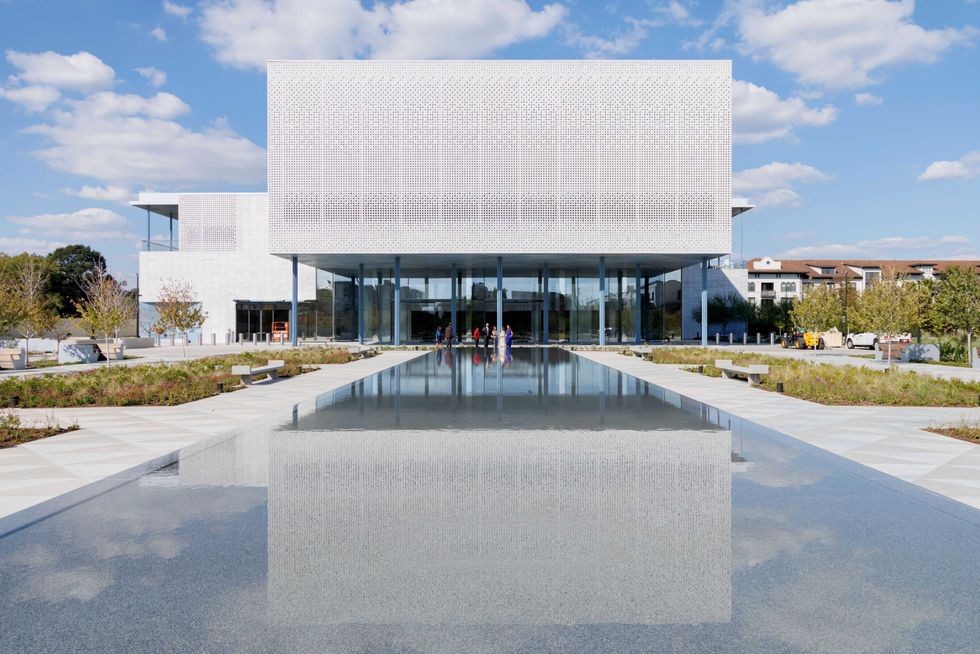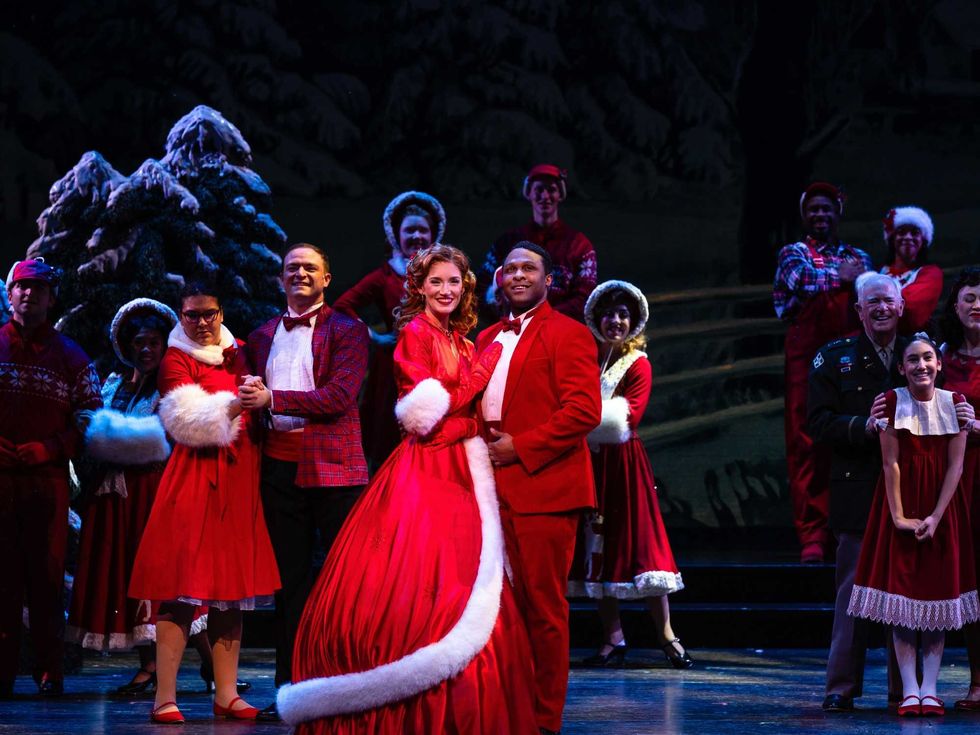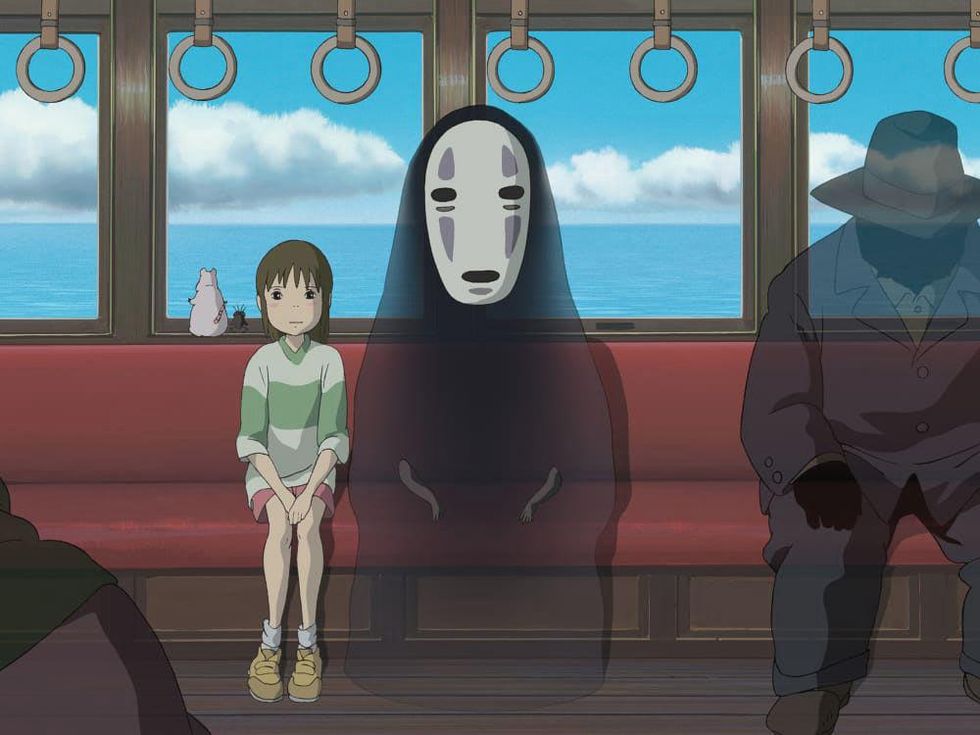Who will win?
The Final Four: Opera Vista Festival compositions are sexy, funny, legal &gay(er)
 Top row from right: Matthew Peterson, Nathan Riebli, Viswa Subbaraman, AlbertoGarcia Demestres, Sonia Megias Lopez, Ronnie Reschef and John Biggs.Photo by Joel Luks
Top row from right: Matthew Peterson, Nathan Riebli, Viswa Subbaraman, AlbertoGarcia Demestres, Sonia Megias Lopez, Ronnie Reschef and John Biggs.Photo by Joel Luks One of the submissions most experimental works drew inspiration from pictorialrepresentation of music notation, using Luciano Berio as reference. "News fromSilence: The Monkey" by Spanish composer Sonia Megias Lopez will not be movingforward to the finals, though personally, one of the most inventive andeffective works.Photo by Joel Luks
One of the submissions most experimental works drew inspiration from pictorialrepresentation of music notation, using Luciano Berio as reference. "News fromSilence: The Monkey" by Spanish composer Sonia Megias Lopez will not be movingforward to the finals, though personally, one of the most inventive andeffective works.Photo by Joel Luks Sara Draper, left, founder and artistic director of Dancepaththeatre, hostsIsraeli-born finalist Ronnie Reschef. Draper masterfully choreographed LembitBeecher's "And Then I Remember," a final performance scheduled Saturday.Photo by Joel Luks
Sara Draper, left, founder and artistic director of Dancepaththeatre, hostsIsraeli-born finalist Ronnie Reschef. Draper masterfully choreographed LembitBeecher's "And Then I Remember," a final performance scheduled Saturday.Photo by Joel Luks The panel of judges offered constructive criticism and probing questions. Fromleft, Buck Ross, Iarlaith Carter, Viswa Subbaraman and Daron Hagen.Photo by Joel Luks
The panel of judges offered constructive criticism and probing questions. Fromleft, Buck Ross, Iarlaith Carter, Viswa Subbaraman and Daron Hagen.Photo by Joel Luks
Pretty music makes us like a character. Ugly music has the opposite effect. Think Smurfs and Gargamel.
This attitude was expressed numerous times by the judges at the 2011 Opera Vista Festival semifinals Wednesday night at the Moores School of Music. It speaks to the importance and place of music in opera, having the ability to contradict and mingle psychological and emotional twists beyond what appears on stage or what is articulated in the text. True enough. It's the stuff that made Wagner's works revolutionary, using leitmotifs to hint at an omniscient truth not known to the characters.
But given the vast range of compositional styles heard, it seems impossible to critique the works of the six hopefuls (narrowed down from 40 compositions received from 12 different countries) using the same schema. It really is difficult to compare apples against oranges, even though they are both fruit (I know, stolen My Big Fat Greek Wedding reference).
The contestants spoke to the everything-goes aesthetic of contemporary music. As with love and war, everything is fair in the genre, as long as you have a reason for doing so and are able to rationalize your choices, verbally.
But traditionalists beware. There is a fine line between being grounded in the past and writing in a been-there-done-that style. And to the über experimentalists, make sure your music can de decoded.
Alberto García Demestres, contestant and composer of Il Sequestro (an opera based on the kidnapping of three women), alluded during his commentary that there is very little, if anything left to explore in contemporary music. If anything, technological progress may open other possibilities.
Could he possibly be right?
When we think of works like Stravinsky's Le Sacre du Printemps for example, you will never hear someone say that it sounds like an earlier composition or it is rooted in another. It broke convention and shifted the journey of aesthetic musical thought. Similarly, Luciano Berio's Sequenzas belong in a milieu on their own, though ingrained in modernism and experimentalism, explored the full range of the instruments outside convention.
In hearing contemporary music today, we want to make associations and find the link to former traditions, and all too often, we can. Not to dismiss the originality of the works, but can today's compositions shift classical music's journey? Or are they mostly an exploration of pre-established parameters?
I am really not interested in an answer, but find discourse around the topic fascinating.
Either way, Opera Vista Festival presented an exceptional array of chamber operas of impeccable artistic merit, a couple of days later, still swimming in my thoughts.
Here is the gist.
In American Idol fashion, the performance order was selected at random. A two-minute introduction by the composer preceded a seven-minute performance of an excerpt meant to illustrate the range of the work.
Then, it was the judges' turn to offer commentary and engage in question-and-answer — Simon Cowell accounts excluded, though the required Brit accent was present.
Audience members were given a ballot and entrusted the important task of choosing four to move on to the finals. Deciders we were.
The panel, consisting of Buck Ross, director and founder of the Moores Opera Center; Iarlaith Carter, associate director of HarrsionParrott; composer Daron Hagen and Viswa Subbaraman, Opera Vista's main man, oscillated between constructive criticism and probing questions. The composers' reaction and handling of the response was as critical as the caliber of the pieces themselves, often exposing weaknesses in the compositional methodology while opening up creative possibilities for improvement.
"In today's classical music climate, it's extremely helpful to the performing organization when the composers have the ability to interact with audiences and answer questions clearly," Subbaraman explained. "That being said, we have had everyone from shy composers to extremely outgoing and 'theatrical' composers. The audience seems to value an honest and thoughtful answer - no matter the 'elegance' of delivery."
Those who spoke from the heart earned the audience's approval. Others, who were at a loss for words or acted defensively lost confidence, not necessarily as a composer, but as someone who's work you want to champion.
We always want the likable person to win and I found my allegiance being slightly altered while I gained better personal insights. Though at times, the more accessible works speak for themselves.
"As an opera company, we would be thrilled to stage any of the works in the semifinals," Subbaraman said. But only four can move forward.
"It's always very close, sometimes by a vote or two. It's always difficult to lose those that do not advance. It feels like losing two of your children."
In no particular order, moving on to the next round are:
- The opera that made kidnapping sexy: Alberto García Demestres' Il Sequestro
Straussian in compositional approach, this traditional opera is full of driving angst, delicious and rich textures that encouraged emotional engagement, more than the others.
- The opera that made tuberculosis funny: Ronnie Reshef's Requiem for the Living
A dark and schadenfreudian comedy that follows a hypochondriac's fear of being terminally ill, in this case, being told that he has a week to live. His wife plans to get it on with the neighbor after his death while the priest outlines his long list of sins, rationalizing his fate. Spoiler alert: It has a happy ending.
- The Boston Legal opera: Matthew Peterson's Voir Dire
A macaw custody battle, love gone wrong and a distressing arrest among murders and courtroom drama, Peterson's work is intense, moving from the hilarious and ridiculous to the tragic and dramatic.
- The opera that turned Oscar Wilde delightfully gayer: John Biggs' Ernest Worthing
Quick witted, slightly kinky and zany, Biggs' fast pace British-style comedy borders on musical theater, and that's a good thing. Based on The Importance of Being Earnest, it's the work that makes even the grumpiest smile.
The festival's finals are tonight at the Moores School of Music at 8 p.m. During this round, audience members will be invited to ask questions. Winners will be announced at the final performance event featuring last year's winner, Lembit Beecher's And I Remember, Saturday.





